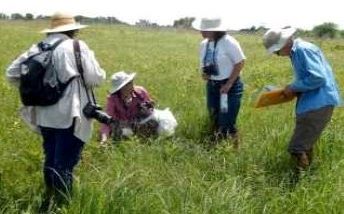Last updated: January 28, 2021
Lesson Plan
George Washington Carver - An Original Conservationist: Welcome to the 21st Century

- Grade Level:
- High School: Ninth Grade through Twelfth Grade
- Subject:
- Science
- Lesson Duration:
- 90 Minutes
- Common Core Standards:
- 9-10.RH.3, 9-10.RH.4, 9-10.RH.7, 11-12.RH.7
- State Standards:
- NGSS (MO CLEs)
HS-LS2-7 reducing impacts of human activities on the environment and biodiversity
HS-LS4-6 mitigate adverse impacts of human activity on biodiversity
HS-LS2-6 complex interactions in ecosystems; impact on organisms and ecosystem - Thinking Skills:
- Creating: Bring together parts (elements, compounds) of knowledge to form a whole and build relationships for NEW situations. Evaluating: Make informed judgements about the value of ideas or materials. Use standards and criteria to support opinions and views.
Essential Question
What would an environmentalist from the early 1900s think of current ecological problems the world is facing?
Objective
Students will evaluate current ecological problems through the lens of a leader in environmentalism from a century ago.
Background
This is lesson the last of five in the George Washington Carver - An Original Conservationist unit.
This is very much a culminating event for this unit. The design of this project would be best served if all previous topics had been handled as mini-projects. However, if you chose to, you could do this as an ecological problems project. This project is written to be done individually but could be adapted to groups if you chose.
The rubric for this project is very generic. There will have to be a component created based on the type of product they chose to submit.
Preparation
Culminating Project: Will vary based on teacher expectations and implementation of the project.
Materials
Download Welcome to the 21st Century (Teacher)
Download Welcome to the 21st Century (Student)
Lesson Hook/Preview
What 21st century environmental problems would be most interesting to the early 20th century scientist, George Washington Carver? What solutions would he propose?
Procedure
Option 1: Worksheet This could be completed as a worksheet if you skipped to Step 5 and just had students answer the 10 questions over a topic you pick or a topic of their choice.
Option 2: Mini-Project This could be simplified to a mini-project by skipping to Step 5 and requiring a uniform method of presentation such as an essay or a slide show.
Option 3: Problem Based Learning This is designed to be a culminating project. Previous lessons in the unit have led to an end result of each group producing something different that when presented to the class or community would create an entire overview of George Washington Carver’s life and impact on ecology. The suggestion would be to use this as a final presentation if you have done all of the other stages at Mini-Projects.
Accommodations for younger or lower level learners: You can adjust Steps 1-4 as you choose, providing as much choice as works for your students. With regard to Step 5 the project can be simplified by doing only the bolded questions.
Assessment Materials
Presentation RubricDownload the Presentation Rubric to assess student presentations.
Supports for Struggling Learners
Reduced questions. The most important questions are bolded so you can reduce focus for students at a lower level (middle school) or for shorter class periods. Adaptations are noted in the teacher instructions.
Enrichment Activities
This is an excellent online exhibit about Tuskegee Institute and George Washington Carver:
Booker T. Washington, George Washington Carver, and the Tuskegee Airmen: LEGENDS OF TUSKEGEE (nps.gov)
Additional Resources
Topics for this project were chosen from 20 Current Environmental Problems That Our World is Facing, by Rinkesh Kukreja. There was no posting data noted for the article but all problems seem to be consistent with 2020. The Environmental Protection Agency is an excellent source. Finding alternative topics is easy to search for if you would like to find some for a specific sub-topic of ecology or for your region.
